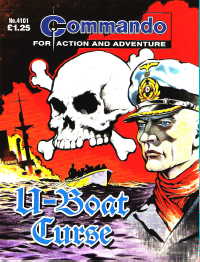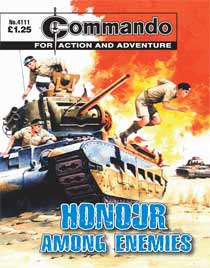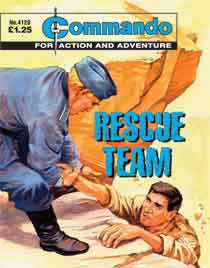 In December 2007 I was fortunate enough to interview Calum Laird, who edits DC Thomson’s Commando. The interview was conducted as research for an article about writing and Calum was very generous with his time.
In December 2007 I was fortunate enough to interview Calum Laird, who edits DC Thomson’s Commando. The interview was conducted as research for an article about writing and Calum was very generous with his time.
I felt it seemed a shame to waste the bulk of the interview, which, although it provided useful background for his piece, wasn’t quoted directly.
The interview includes tips on pitching to various DC Thomson titles such as The Dandy, Beano and general advice on pitching to comics editors that we think is really useful.
So, here it is, presented for the first time in its entirety on downthetubes… enjoy!
Matt Badham: Where were you before you recently re-joined Commando?
Calum Laird: I was on The Dandy.
MB: Do The Dandy take unsolicited submissions?
Calum: They do, yes. It’s just a question of emailing or writing to the editor. There’s less script material there now though, because The Dandy’s changed to more of a magazine format with comic strips.
MB: Do The Beano take scripts?
Calum: You can always try, but The Beano has actually got quite a large staff. Most of the copy, as I understand it, never having worked on the comic, is generated within that office. But, you know, if you don’t ask, you don’t get.
MB: When you were working on The Dandy, did you prefer it if a writer came bundled with an artist?
Calum: No. I can only speak for myself, but I would rather have the two separate because it gives editorial more flexibility. If you’re running The Dandy, then you know you’ve got certain artists that you want to use very week and certain characters that you want to use every week. If somebody rolls in with a script and an artist, the whole package, then it puts you in a difficult position. Even if the submission is good, you’ve got the problem of shoehorning it in amongst your regulars? So, I would say that it’s probably better not to team up with an artist.
MB: So, you’re looking for a script that shows a writer can write gags and Dandy characters and then you might assign them to one of your characters, say for a fill-in episode?
Calum: Yeah, yeah.
MB: How long ago were you on The Dandy (NB: this interview was conducted in December, 2007)?
Calum: Until about three months ago.
MB: So that’s reasonably current.
Calum: I don’t know what the day-to-day situation is like now. [Edtor’s note: Calum kindly updated us in June 2008 to say that the situation is the same as when he left the title. Current Dandy editor Craig Graham eagerly awaits your submissions!]
The other thing to bear in mind is that those comics produce annuals. The annual work is over and above the weekly work, so quite often there’s scope there for scripts. I know that Ferg Handley, who writes for Commando, did stuff for a couple of Dandy annuals, at least. The annual scripting can be different from the weekly scripting.
MB: So, a submission piece might include a script, and a few ideas for their characters and it would be good also to make it clear that this was an audition piece.
Calum: I would say that would be looked on favourably. Although I don’t know if they’ve got any openings at the moment, if good material comes in and they’re in a financial position to buy it then they may well.
MB: In your experience as an editor, what sort of frequency of sending ideas and scripts, in terms of a writer keeping tabs on a potential market, is appropriate and what sort of frequency becomes pestering?
Calum: It depends on what signals the editors are giving out. When I was on The Dandy, if someone kept sending stuff even though I’ve told them that I didn’t have an opening, then it drove me bananas. Instead, you should leave it two or three months and then just send an email asking if there’s any change. I think three months…
MB: That’s a good ballpark figure?
Calum: I would think so. The editor will have remembered your submission and if they think that something’s coming up, they will get in touch.
You also have to be aware that editors, as well as staple artists, will also have staple writers. They will inevitably get preference over someone new.
MB: I suppose that those guys have proved that they’re reliable and can do the job, and you don’t want to whittle away your stable of writers by giving away too many potential jobs.
Calum: That’s exactly it.
 MB: On to Commando. What makes a perfect Commando, from the point of view of the writing?
MB: On to Commando. What makes a perfect Commando, from the point of view of the writing?
Calum: I’m not sure, to be honest, that there is such a thing. It’s not set in stone, but there are elements that that we have got to have. Whether these elements make a story a perfect Commando, I don’t know. I could give you a formula for the perfect Commando and get a story in tomorrow that is totally different. It doesn’t follow all the rules and I could read it and say, “That’d make a brilliant Commando story.”
It’s very, very difficult. What you must have is the complexity of plot that 63 pages afford you.
MB: Commando stories, which use highly compressed comic strip storytelling, are, I suppose, “novelistic”.
Calum: Yes. They’re very story hungry. They gobble story up.
A common mistake, and this doesn’t just apply to Commando, is that novice writers don’t read the publication they’re aiming at. I’ve found this everywhere I’ve worked. People have sent in submissions based on what they think the publication is. They’ve possibly looked at a couple and then thought that they immediately know what the publication is about. And they don’t.
I’ve said this to a number of people, “You’ve got a good idea, but it needs development. Go away and read more Commandos and then come back to me.”
 The writer looking at a new market has to have the ability to deconstruct what he or she is reading. If you can’t do that and you’re the sort of writer who just puts things down on paper, but doesn’t know why, then I doubt very much whether you’re going to make a success of commercial writing. Without seeing a magazine or comic’s writers’ guidelines, you should be able to read that magazine or comic and see the qualities that they have in most or all of their stories.
The writer looking at a new market has to have the ability to deconstruct what he or she is reading. If you can’t do that and you’re the sort of writer who just puts things down on paper, but doesn’t know why, then I doubt very much whether you’re going to make a success of commercial writing. Without seeing a magazine or comic’s writers’ guidelines, you should be able to read that magazine or comic and see the qualities that they have in most or all of their stories.
MB: Have said that, to a certain extent, editors do like to be surprised by the stories they receive, don’t they?
Calum: Let me tell you an anecdote. We used to have an author, who sent in his stuff and it was awfully badly typed and there’d be misspellings with little handwritten corrections. It was messy. He made mistakes. He had all sorts of silly phrases he used. But the core of his story, every story, came down to people.
He had observed people his entire life and because his stories were so good from that point of view, you could ignore the bad spelling and the various other bits and pieces, because that’s what a sub-editor’s job is there to do, to make sure everything is all right. Obviously, it’s much better if it comes in properly written but if you’ve got a writer whose stories are good enough, then you’re prepared to make an allowance for that.
Whereas you get other people, their stories come in and are beautifully set out, spelt, punctuated, adequate stories, the whole thing and somehow it’s soulless. So, it’s up to writers to push the envelope a bit here and there to make their stuff different from everyone else’s.
Calum: He was called Cyril Walker. He’s sadly dead now. He wrote for us for a long, long time and his stories are all, well, some are better than others, but all really revolve around people.
MB: In terms of the script format, it’s quite fixed for Commando isn’t it?
Calum: It is. With us, you’re moving the story on in big chunks with the captions and you have to indicate to the artist where you are and what’s going on, so it really needs to be quite detailed.
Also, it’s very factual. You’ve got to get the facts right. You wouldn’t have motorbikes in the desert in 1865. So, you have to give the artist as much information as you can. With Commando you have to say what uniforms the characters were wearing, what guns they were carrying and all those things. It’s very difficult.
MB: And the readers are quite knowledgeable about those things aren’t they? They’ll pick you up on them.
Calum: They are and they will, by and large.
MB: Has the Internet made the research side easier?
Calum: It has. Whereas before we had cupboard upon cupboard of reference books, we now have the Internet accessible from our desks. The problem with it is that there is so much stuff out there. Sometimes you can search for something for hours and not find it. It doesn’t matter how you word your description for the search engine you can’t find it and it later pops up when you’re looking for something totally unrelated.
MB: Calum Laird, thanks for your time.
Interview conducted and transcribed by Matt Badham Interview copy-edited by Calum Laird and Matt Badham. Special thanks to John Freeman of downthetubes
• See Also: Jeremy Briggs 2008 interview with Calum about Commando
Matt Badham is a freelance writer. His work has appeared in the Judge Dredd Megazine, 2000AD and Big Issue in the North.
Categories: British Comics, Comic Creator Interviews, Comic Creator Spotlight, Creating Comics, Features

 Catching up with the Comics Laureate! An interview with Bobby Joseph
Catching up with the Comics Laureate! An interview with Bobby Joseph  Creating Comics: An Interview with Commando writer, and former editor, Calum Laird
Creating Comics: An Interview with Commando writer, and former editor, Calum Laird  Creating Comics: Alec Worley and Dani talk “Black Beth”, Rebellion’s new sword and sorcery special
Creating Comics: Alec Worley and Dani talk “Black Beth”, Rebellion’s new sword and sorcery special